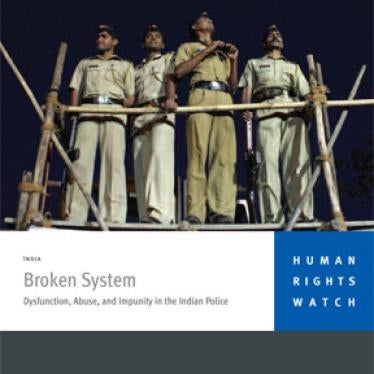The Oscar-winning film "Slumdog Millionaire" starts with a shock: Policemen hook the young protagonist Jamil up to a car battery to try to force him to confess to a crime he did not commit. Jamil soon gets a reprieve, as an inspector sits him down and lets him explain how he knew the answers to those million-rupee trivia questions.
Though the film earned accolades in Hollywood, it unleashed a firestorm of criticism in India for its gruesome portrayal of poverty, which some called one-dimensional. But few critics in India - if anyone at all - disputed the film's depiction of police torture: It is a harsh and undeniable reality. Across India, police torture is commonplace. Police officers consider torture a necessary tool to punish criminals or elicit confessions, whether true or false. For decades, successive governments have failed to deliver on promises to hold the police accountable for abuses and to build professional, rights-respecting police forces.
During recent interviews - over plates of English-style biscuits and cups of over-sugared tea - some police officers opened up with what seemed a keen desire to be understood. One told me he was exploited by superiors who demanded unrealistically that he solve cases quickly while cramming his work schedule with patrols and V.I.P. escort duties. Complaining that he had neither the training nor the equipment to use scientific investigation techniques, he admitted that he had beaten suspects to extract confessions.
He also told me he had recently been ordered to commit a fake "encounter killing." It is a common practice for the police to secretly execute a suspect, then claim the victim died after initiating a shoot-out. This happens so often that all Indians know the term "encounter."
"I am looking for my target," the officer told me. "I will eliminate him. ... I fear being put in jail, but if I don't do it, I'll lose my position."
Most of the police officers I met did not resemble cinematic villains. They were often haggard men and women who work long hours with little time off to see their families or get a full night's sleep. Many said they often lack basic equipment - vehicles to get to a crime scene or witness interview, tools to gather evidence, and even paper on which to write reports.
Though India's police forces battle many pressing problems - including terrorism, organized crime and religious and caste violence - they are in a serious state of disrepair. Many problems stem from under-staffing, with just one civil police officer for every 1,037 Indian residents, about half Asia's regional average and less than a third of the global average of one officer per 333 people.
Police station chiefs told me they knew their officers, embittered and exhausted, sometimes took out their anger violently on the public. Many of the more than 60 lower-ranking officers interviewed for a new Human Rights Watch report said their superiors expected them or ordered them to torture suspects. The pressure to resolve cases is intense, even if it means arresting and torturing an innocent person.
The police use escalating levels of violent crime and the acquittal rate - at about 90 percent, one of the world's highest - to justify these abuses. But vigilante-style justice is an archaic and ineffective practice for a country reaching for modernity. It also undermines India's status as the world's largest democracy.
The government knows this. Prime Minister Manmohan Singh has made a commitment to take on police reform in an "urgent and serious manner." But as our research has shown, reform requires strong measures, including sending abusive police officers to prison, dismissing those who allow abuses to take place, and setting up independent and powerful police review commissions. Only decisive and sustained action will send a clear signal across the police ranks that torture and killing are never acceptable.
At the same time, the government needs to overhaul a broken system. It needs to treat the police as people with rights, too. Officers need the time, training and equipment necessary to develop professional, rights-respecting policing tactics. They need time off, decent housing and incentives to behave properly. A system that does not provide these resources effectively discourages the police from changing their deeply rooted, abusive patterns of behavior.
Reform will not be easy, but it is the only way to transform India's police forces into the kind of institution that Indians respect instead of fear.
Naureen Shah is a Leonard H. Sandler fellow at Human Rights Watch.






